|
|
|
Sort Order |
|
|
|
Items / Page
|
|
|
|
|
|
|
| Srl | Item |
| 1 |
ID:
178277
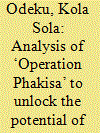

|
|
|
|
|
| Summary/Abstract |
South Africa is endowed with vast ocean resources and wealth which have the potential to provide enormous socio-economic goods and services to the people and create massive economic growth and wealth if vigorously explored and tapped. This assertion is made against the backdrop of the recent government strategical initiative, under the auspices of ‘Operation Phakisa’, to unlock and explore the full potential of the ocean’s wealth to drive economic growth, create jobs and alleviate poverty. This paper seeks to accentuate that the Operation Phakisa initiative has the potential to strategically unlock underexplored ocean resources for purposes of creating sustainable economic growth, development, and alleviation of hunger and poverty. It concludes that effective and sustainable use of the ocean’s wealth depends on good, efficient governance policies, practices and management. Methodically, a qualitative non-empirical research approach was adopted and utilized in this study by sourcing, drawing upon and using information and insights from contemporary literature to address identified problems.
|
|
|
|
|
|
|
|
|
|
|
|
|
|
|
|
| 2 |
ID:
178265
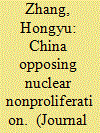

|
|
|
|
|
| Summary/Abstract |
Why did a would-be recognized nuclear state oppose nonproliferation for two decades, but then change its position in 1984? Based on extensive fieldwork in Beijing where the author conducted 20 interviews with high-profile Chinese government and military officials, ambassadors of disarmament, and nuclear and astronautic scientists, this article argues that China openly opposed nonproliferation to give its nascent nuclear program time to achieve a retaliatory capability. Once this goal was fulfilled in the mid-1980s, China began accepting nonproliferation norms. While China’s fervent opposition seemed ideological in a revolutionary era, it was indeed a rational behavior in pursuit of security interests.
|
|
|
|
|
|
|
|
|
|
|
|
|
|
|
|
| 3 |
ID:
178269
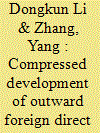

|
|
|
|
|
| Summary/Abstract |
Unlike the conventional understanding of China’s outward foreign direct investment, we found that the pattern of compressed development better reflects China’s outward foreign direct investment in the 21st century. The compressed development of Chinese outward foreign direct investment is characterized by a much higher growth rate than that of earlier industrializers and greater structural changes in types of investment, investors and destination countries. These changes result in new challenges to the Chinese government in dealing with domestic and foreign actors. Nevertheless, these challenges also create incentives for the Chinese government to improve how it interacts with Chinese investors and regulates their investment behavior.
|
|
|
|
|
|
|
|
|
|
|
|
|
|
|
|
| 4 |
ID:
178266


|
|
|
|
|
| Summary/Abstract |
Grounded in 41 semi-structured interviews, this article examines the extent to which the complaints system under regulatory oversight of the Public Sector Anti-Corruption Commission (PACC) in Thailand has been effective for addressing corruption complaints. The present article revisits the theoretical arguments of the structural school and the reputational school over agency independence, deploying such arguments to analyze the way in which de facto independence of the anti-corruption agencies (ACAs) operating in a highly politicized environment can be protected. The analysis finds that a high level of legal independence is the best possible way to safeguard de facto independence, enhancing the overall effectiveness of the ACAs working in highly politicized countries. In addition, the empirical findings suggest that a low level of legal independence, a lack of prosecution power, inadequate qualified staffing, and the absence of meaningful public participation are the core factors contributing to the ineffectiveness of the PACC system.
|
|
|
|
|
|
|
|
|
|
|
|
|
|
|
|
| 5 |
ID:
178256
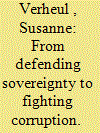

|
|
|
|
|
| Summary/Abstract |
In this article, I examine the shifting language of debates over law and justice in Zimbabwe in the run-up to, and following, the November 2017 coup. I argue that the rhetoric Zimbabwe African National Union–Patriotic Front (ZANU–PF) drew upon to secure its authority and negotiate legitimacy through law, shifted from a focus of ‘sovereignty’ and ‘protection’, to one of battling ‘corruption’ and ‘criminality’. At the same time, there remained a consistency in the manner that the legal system was used to target a select part of the country’s population, those opposed to ZANU–PF and its vision for the future.
|
|
|
|
|
|
|
|
|
|
|
|
|
|
|
|
| 6 |
ID:
178262


|
|
|
|
|
| Summary/Abstract |
Drought is a major challenge threatening agricultural productivity in uMsinga. The occurrence of drought is expected to increase in coming decades, intensifying in severity, duration and the way people are affected by drought. The objective of this study is to understand small-scale farmers’ and rural communities’ perceptions of drought, its environmental and socio-economic impacts, adaptive and mitigation measures at household level and their satisfaction with the government’s role in drought management in the community. The study utilized a combination of quantitative and qualitative research methods, in the form of questionnaires, focus groups and key informant interviews. The sample size for the research study was 180 respondents for the questionnaire component and a total of 30 respondents for the focus groups and key informant interviews. The results show that increased levels of poverty, food insecurity and increased migration were the main socio-economic impacts perceived by respondents. Water scarcity, crop failure, forest degradation and an increase in average temperatures were perceived by respondents as the main environmental impacts caused by drought in uMsinga. Respondents perceived drought as a serious threat to agricultural production and adopted various indigenous adaptive strategies. A majority of respondents adopted a reactive approach to drought management, and therefore did not adopt many mitigation measures.
|
|
|
|
|
|
|
|
|
|
|
|
|
|
|
|
| 7 |
ID:
178281


|
|
|
|
|
| Summary/Abstract |
To what extent do supporters of electoral losers and nonvoters maintain lower evaluations of institutions post-election? A sizable literature identifies a divergence in perceptions among winners and losers regarding democratic satisfaction, with few studies extending this to perceptions of other electoral and nonelectoral institutions nor to include nonvoters. The timing of the 2015 Asian Barometer survey in South Korea allows us to identify evaluation prior to Park Geun-Hye’s impeachment scandal. Analysis consistently finds that those who supported the losing presidential candidate in 2012 maintained lower evaluations of institutions, with inconsistent results regarding nonvoters.
|
|
|
|
|
|
|
|
|
|
|
|
|
|
|
|
| 8 |
ID:
178255


|
|
|
|
|
| Summary/Abstract |
This article argues that, through the coup, the military has become more visible in national politics in post-Mugabe Zimbabwe. The current situation under President Mnangagwa marks a qualitative difference with the military under Mugabe’s rule. Currently, in now being more prominent, the military is politics and is the determinant of any political transition that may be forthcoming in Zimbabwe. However, if it deems it necessary, the military accommodates civilian politicians into politics in order to ‘sanitize’ the political landscape in its own interests. Simultaneously, despite their involvement in the coup, ordinary soldiers feel increasingly marginalized under Mnangagwa’s government.
|
|
|
|
|
|
|
|
|
|
|
|
|
|
|
|
| 9 |
ID:
178254
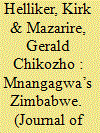

|
|
|
|
|
| Summary/Abstract |
Three years after the November 2017 coup in Zimbabwe and the installation of Emmerson Mnangagwa as ruling party and state president, there is growing scholarly interest in identifying the character of the post-coup regime, particularly in comparison to the 37-year reign of Robert Mugabe’s ZANU-PF. So far, there are continuities and changes, with increasing concerns about a qualitative shift in the militarization of Zimbabwean state and society under Mnangagwa and the further closing down of civil society space. Perhaps more so than during the first two years of post-coup Zimbabwe, this has become abundantly clear during the Covid-19 pandemic lockdown.
|
|
|
|
|
|
|
|
|
|
|
|
|
|
|
|
| 10 |
ID:
178260
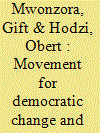

|
|
|
|
|
| Summary/Abstract |
Nelson Chamisa is central to the political terrain of contemporary Zimbabwe. Post the soft coup of November 2017 and the death of Morgan Tsvangirai in early 2018, Chamisa became president of the Movement for Democratic Change party and contested the July 2018 presidential election. The tempo of changes in the Movement for Democratic Change presidency is not related directly to the shift from Mugabe to Mnangagwa. However, broader politics formed an important context for Chamisa’s contested claim for the Movement for Democratic Change presidency. In examining Chamisa and the Movement for Democratic Change, the article highlights linkages between personality politics and electoral mobilization, and how this relates to political party institutionalization.
|
|
|
|
|
|
|
|
|
|
|
|
|
|
|
|
| 11 |
ID:
178257


|
|
|
|
|
| Summary/Abstract |
The paper examines the Mnangagwa government’s economic policies in Zimbabwe. It looks at its ‘new’ dispensation economic policies, passed off as creating a middle-income economy by 2030. The study suggests that these policies, encapsulated in the ‘open for business’ rhetoric, were designed to create an image of political and economic reform. However, efforts to mask the ZANU-PF government’s unmistakable authoritarian traits failed. It is increasingly apparent that there is no significant departure in economic policies from the previous Mugabe regime. Zimbabwe’s crisis endures as the technocrats fail to resolve the monetary crisis and the economy continues to collapse.
|
|
|
|
|
|
|
|
|
|
|
|
|
|
|
|
| 12 |
ID:
178273


|
|
|
|
|
| Summary/Abstract |
The study examines the nature of disputes, which are prevalent in water, sanitation and hygiene (WASH) programming and suggests possible conflict management and resolution mechanisms. An online web-based survey, hosted on the popular Survey Monkey platform, was conducted through the Somalia WASH Cluster to 40 ‘active’ member organisations. A response rate of 73% was achieved. Thematic analysis was conducted using NVivo 12. The type of conflicts identified are as follows: visible versus non-visible benefits, emergency versus development focus, the young and the old, insiders versus outsiders, local versus donor priorities and men versus women. The article goes on to suggest possible conflict resolution mechanisms, which include: planning together with communities, continuum programming, setting up early warning systems, harmonisation of institutions managing WASH resources and the development of localised Memorandums of Understanding. It is recommended that the complexities of conflict and fragility require different approaches. The approaches would apply to both relief and developmental WASH programming.
|
|
|
|
|
|
|
|
|
|
|
|
|
|
|
|
| 13 |
ID:
178264


|
|
|
|
|
| Summary/Abstract |
Between 2000 and 2008, Zimbabwe experienced debilitating economic, political and social problems. The crises were characterised by political unrest, economic downturn, hyperinflation, food insecurity, breakdown in the provision of basic social services and the intensification of the effects of global warming and climate change. The period saw the entry of many international non-governmental organisations (NGOs), including GOAL Zimbabwe, which came to deal with the unfolding humanitarian crisis. Key informant interviews were conducted with 21 interviewees from GOAL, Buhera Rural District Council officials, Agritex officers and project beneficiaries. Atlas Ti was used to analyse the data into key themes. In 2010, GOAL Zimbabwe chose to stay and reincarnate itself and went through a very difficult process from being a relief to a development organisation. Results show the process on which GOAL embarked in transitioning from relief to recovery. The evidence coming out of the discussions indicates that with the right levels of support from development partners and commitment by communities, it is possible for both organisations and communities to transition from a humanitarian and relief mindset to a development paradigm.
|
|
|
|
|
|
|
|
|
|
|
|
|
|
|
|
| 14 |
ID:
178275


|
|
|
|
|
| Summary/Abstract |
We ask to what extent opposition to same-sex marriage in South Korea is driven by Protestant identification and how this differs from Catholic and non-Christian views. Furthermore, is there a separate demographic, partisan or ideological influence beyond that captured by religious identity? Analysis of the 2016 Korean General Social Survey (KGSS) data finds not only clear perceptual distinctions between Protestants versus Buddhists and Catholics, but that partisan distinctions endure, even after controlling for the more popular non-LGBT-specific anti-discrimination legislation. In addition, younger and female respondents were more supportive of legalization, while education did not have the same effect as in the broader LGBT literature.
|
|
|
|
|
|
|
|
|
|
|
|
|
|
|
|
| 15 |
ID:
178258


|
|
|
|
|
| Summary/Abstract |
This article analyses the dynamics underpinning formal political institutions in relation to women’s participation in Zimbabwe, with a focus on the post November 2017 context. Patriarchal continuities and not changes characterize the post-November period. Under the “new dispensation”, patriarchy, intertwined with the increase in militarized masculinities, is producing exclusion with limited spaces for women’s participation. Simultaneously, Zimbabwean women at times have been destabilizing political spaces, while also being complicit in reproducing patriarchal practices and violence. The military-assisted transition is significant because of the fall of Grace Mugabe and the broader implications of this for women and politics in Zimbabwe.
|
|
|
|
|
|
|
|
|
|
|
|
|
|
|
|
| 16 |
ID:
178259
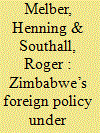

|
|
|
|
|
| Summary/Abstract |
Under the presidency of Mnangagwa, Zimbabwe’s foreign policy is characterized by the desire to ‘re-engage’ with the West with a view to securing the removal of sanctions and encouraging investment. In this, it has received the backing of the African Union and Southern African Development Community states. Simultaneously, the violence of the Mnangagwa regime has reinforced the reluctance of the West to remove sanctions, and Zimbabwe has even begun to test the patience of its neighbours. The government has placed renewed faith in the ‘Look East Policy’, but China is seeking to match its investments with tighter control.
|
|
|
|
|
|
|
|
|
|
|
|
|
|
|
|
|
|
|
|
|